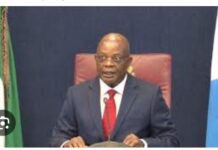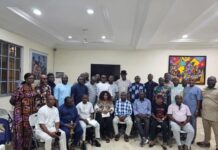In a move that has already sent shockwaves through Nigeria’s political and security circles, President Bola Tinubu announced the appointment of new heads for two of the nation’s most critical intelligence and security agencies. Ambassador Mohammed Mohammed has been named the Director-General of the National Intelligence Agency (NIA), while Adeola Ajayi steps into the role of Director-General of the Department of State Services (DSS).
The timing and implications of these appointments cannot be overstated, especially given Nigeria’s ongoing security challenges and the deeply entrenched political dynamics at play.
Tinubu’s Strategic Gambit: A Move to Cement Power?
The appointment of Mohammed Mohammed and Adeola Ajayi is being viewed by many as a strategic move by President Tinubu to consolidate his grip on power. With these appointments, Tinubu now has his chosen individuals at the helm of two of the most powerful security agencies in Nigeria. But what does this mean for the country’s fragile democracy and its ongoing battle against insecurity?
Mohammed and Ajayi’s ascensions are not merely routine appointments; they represent a calculated reshuffle with far-reaching consequences. Tinubu, a political chess master, is known for his ability to navigate Nigeria’s complex power structures. By placing trusted allies in key positions, he ensures that the levers of state security are firmly under his control. However, this move raises concerns about the potential for these agencies to be politicized, undermining their primary mandate of protecting the nation.
The Resignations: Coincidence or Coercion?
The official narrative surrounding the resignations of the former NIA Director-General Ahmed Abubakar and DSS Director-General Yusuf Bichi is one of voluntary departure. Abubakar cited family and personal reasons, while Bichi’s resignation remains shrouded in official silence. However, insiders suggest that these resignations may have been anything but voluntary. Was there pressure from the highest echelons of power? Were these resignations a prelude to Tinubu’s strategic appointments?
Speculation is rife that Abubakar and Bichi were encouraged to step down to pave the way for Tinubu’s loyalists. The timing of their resignations, coming just as Tinubu’s administration is gaining momentum, cannot be ignored. The political implications are clear: Tinubu is consolidating power, and no stone will be left unturned in his quest to secure his administration’s legacy. But at what cost?
Ambassador Mohammed Mohammed: A Diplomat in the Hot Seat
Mohammed Mohammed’s career is nothing short of illustrious. A seasoned foreign service officer, he has served in some of the world’s most volatile regions, including North Korea, Pakistan, Sudan, and Libya. His deep understanding of global geopolitics and intelligence makes him a formidable figure in Nigeria’s security architecture. However, his appointment as NIA Director-General comes at a time when the agency is facing significant challenges.
The NIA has been plagued by controversies in recent years, including allegations of mismanagement and internal discord. As Mohammed takes the reins, he faces the daunting task of restoring the agency’s credibility and effectiveness. His diplomatic experience will undoubtedly be an asset, but the question remains: Can he navigate the murky waters of Nigeria’s domestic intelligence landscape, which is rife with political interference and factionalism?
Adeola Ajayi: From State Director to National Security Czar
Adeola Ajayi’s rise to the top of the DSS is a testament to his skill and determination. Having served as State Director in several states, including Bauchi, Enugu, Bayelsa, Rivers, and Kogi, Ajayi has a wealth of experience in handling complex security issues at the grassroots level. His appointment as DSS Director-General is seen by many as a reward for his years of dedicated service. However, with this new role comes immense pressure.
The DSS, under Ajayi’s leadership, will be expected to tackle Nigeria’s escalating security challenges, including terrorism, banditry, and separatist movements. Ajayi’s ability to navigate these challenges will be crucial to maintaining national stability. But with the DSS’s reputation for heavy-handed tactics and allegations of human rights abuses, Ajayi will need to strike a delicate balance between security and civil liberties. Will he be able to reform the agency from within, or will he succumb to the same pressures that have plagued his predecessors?
The Political Implications: A Nation on Edge
The appointments of Mohammed and Ajayi are more than just routine bureaucratic changes; they are a reflection of the broader political landscape in Nigeria. Tinubu’s move to place trusted allies in key security positions suggests a desire to control the narrative as the 2027 elections approach. This centralization of power has raised alarms among opposition parties and civil society groups, who fear that these appointments could be used to suppress dissent and manipulate electoral outcomes.
Nigeria’s history is replete with instances where security agencies have been used as tools of political repression. The concern now is whether the NIA and DSS, under their new leadership, will operate with the independence and impartiality required to safeguard Nigeria’s democracy. Or will they become instruments of state power, serving the interests of the ruling elite?
National Security at a Crossroads: Challenges Ahead
Nigeria is currently facing an array of security challenges that threaten its very existence as a nation-state. The Boko Haram insurgency, which has ravaged the Northeast for over a decade, shows no signs of abating. In the Northwest, banditry has reached unprecedented levels, with entire communities being displaced. The Southeast is grappling with the resurgence of separatist agitations, while the South-South is dealing with renewed militancy in the oil-rich Niger Delta.
In this context, the roles of the NIA and DSS are more critical than ever. The NIA, as Nigeria’s external intelligence agency, must focus on gathering actionable intelligence to counter external threats, particularly in the Sahel region, where terrorist groups are gaining ground. The DSS, on the other hand, must enhance its counterintelligence operations and collaborate more effectively with other security agencies to address internal threats.
However, the success of these agencies will depend largely on the leadership provided by Mohammed and Ajayi. Their ability to navigate the complex security landscape, build trust within their agencies, and maintain the delicate balance between national security and human rights will determine Nigeria’s trajectory in the coming years.
Public Perception: Trust, Distrust, and Everything in Between
The public reaction to these appointments has been mixed. On one hand, there is cautious optimism that new leadership could bring about much-needed reforms in the NIA and DSS. On the other hand, there is widespread skepticism about the motivations behind these appointments. Many Nigerians view the reshuffle as a power grab by Tinubu, with little regard for the actual security needs of the nation.
This skepticism is not unfounded. Nigeria’s security agencies have a long history of being used for political purposes, from the era of military dictatorships to the present day. The challenge for Mohammed and Ajayi will be to prove that they are not merely political appointees but are genuinely committed to the security and well-being of the Nigerian people. Transparency, accountability, and a clear commitment to the rule of law will be key to gaining public trust.
The International Dimension: What Do Nigeria’s Allies Think?
Nigeria’s security situation is of great concern not just to its citizens but also to its international allies. The United States, United Kingdom, and European Union have all invested heavily in supporting Nigeria’s counterterrorism efforts and have provided significant aid to bolster the capacity of its security agencies. The appointment of new heads of the NIA and DSS is likely to be closely scrutinized by these allies, who will be looking for signs of continuity and stability.
Mohammed’s extensive diplomatic experience could be an asset in maintaining and strengthening Nigeria’s international security partnerships. However, any perception that the NIA or DSS is being politicized could strain these relationships and reduce the effectiveness of international cooperation. It is therefore imperative that both agencies demonstrate a clear commitment to their core mandates and avoid being drawn into the political fray.
Conclusion: A Defining Moment for Nigeria’s Security Architecture
The appointments of Mohammed Mohammed as NIA Director-General and Adeola Ajayi as DSS Director-General represent a critical juncture for Nigeria’s security architecture. As the country faces multiple existential threats, the leadership of these two agencies will play a pivotal role in shaping Nigeria’s future.
While these appointments have the potential to bring about positive change, they also carry significant risks. The centralization of power within the presidency, the potential politicization of the security agencies, and the ongoing challenges of insecurity all pose serious threats to Nigeria’s stability.
As the nation watches closely, the actions of Mohammed and Ajayi in the coming months will be crucial in determining whether Nigeria can overcome its current challenges and emerge stronger, or whether it will continue to be mired in insecurity and political instability. The stakes have never been higher, and the future of the nation hangs in the balance.











